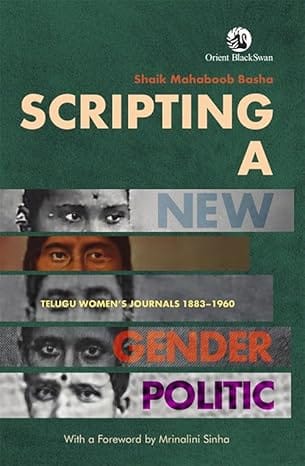WELCOME TO MIDLAND BOOK SHOP!
SHOP FOR
- Non-ficton
- Non-ficton
- Contemporary Fiction
- Contemporary Fiction
- Children
- Children
- Comics & Graphic Novels
- Comics & Graphic Novels
- Non-Fiction
- Non-Fiction
- Fiction
- Fiction
Shop No.20, Aurobindo Palace Market, Hauz Khas, Near Church +91 9818282497 | 011 26867121 110016 New Delhi IN
Midland The Book Shop ™
Shop No.20, Aurobindo Palace Market, Hauz Khas, Near Church +91 9818282497 | 011 26867121 New Delhi, IN
+919871604786 https://www.midlandbookshop.com/s/607fe93d7eafcac1f2c73ea4/677cda367903fd013d69b606/without-tag-line-480x480.png" [email protected]9789354429842 6897349208ec66f757a50cae Scripting A New Gender Politic Telugu Women�s Journals, 1883�1960 https://www.midlandbookshop.com/s/607fe93d7eafcac1f2c73ea4/6897349308ec66f757a50cb6/518c4b-quvl-_sy466_.jpg 9789354429842
In the nineteenth century, spurred by colonial criticism of Indian social practices, Indian male intellectuals embarked on a project of social reform, at the heart of which was improving the condition of women. Education was central to their efforts, and as print cultures flourished across the subcontinent, the reformers launched Telugu-language journals and magazines that focused exclusively on women readers. From the first journals—Sathihitha Bodhini and Telugu Zenana—to the later Hindu Sundary, Andhra Mahila and others, they became a site for new discourses on the ‘woman’s question’. A comprehensive history of Telugu women’s journals from the late nineteenth to the mid-twentieth century, this book highlights women’s own engagement with the social reform movement. While the initial publications were spearheaded by Western-educated male social reformers, from 1903 onwards, women in Andhra emerged as editors, managers and publishers of women’s journals. Led by an awareness of their duty to lead the women’s movement for change, women intellectuals focused on key issues: debates on child marriage, widowhood and widow remarriage, a reformed domesticity, lack of civil and political rights for women, and modern education for women. Their efforts encouraged the formation of a network of women readers and writers. Drawing from a wealth of largely untapped archival sources that include personal papers, letters, memoirs, stories and photographs, the book visibilises women’s words and deeds, their views on the emerging anti-colonial struggle, and their efforts to create a new print-public sphere. This meticulous analysis of women’s print culture is supplemented with appendices that include the publication timeline of important journals and translations of select articles. The book will be essential reading for scholars of Telugu print history, nineteenth-century social reform and the women’s movement.
in stockINR 1274
1 1
Email ID already exists!
Your Current password is incorrect
Password Updated Successfully
Thanks for your Feedback
- Home
- Literature & Fiction
- Scripting A New Gender Politic Telugu Women�s Journals, 1883�1960
Scripting A New Gender Politic Telugu Women�s Journals, 1883�1960
ISBN: 9789354429842
₹1,274
₹1,415 (10% OFF)SIZE GUIDE
Sold By: Hauz Khas - Aurobindo Market
Details
- ISBN: 9789354429842
- Author: Shaik Mahaboob Basha
- Publisher: Orient Black Swan
- Pages: 536
- Format: Paperback
Book Description
In the nineteenth century, spurred by colonial criticism of Indian social practices, Indian male intellectuals embarked on a project of social reform, at the heart of which was improving the condition of women. Education was central to their efforts, and as print cultures flourished across the subcontinent, the reformers launched Telugu-language journals and magazines that focused exclusively on women readers. From the first journals—Sathihitha Bodhini and Telugu Zenana—to the later Hindu Sundary, Andhra Mahila and others, they became a site for new discourses on the ‘woman’s question’. A comprehensive history of Telugu women’s journals from the late nineteenth to the mid-twentieth century, this book highlights women’s own engagement with the social reform movement. While the initial publications were spearheaded by Western-educated male social reformers, from 1903 onwards, women in Andhra emerged as editors, managers and publishers of women’s journals. Led by an awareness of their duty to lead the women’s movement for change, women intellectuals focused on key issues: debates on child marriage, widowhood and widow remarriage, a reformed domesticity, lack of civil and political rights for women, and modern education for women. Their efforts encouraged the formation of a network of women readers and writers. Drawing from a wealth of largely untapped archival sources that include personal papers, letters, memoirs, stories and photographs, the book visibilises women’s words and deeds, their views on the emerging anti-colonial struggle, and their efforts to create a new print-public sphere. This meticulous analysis of women’s print culture is supplemented with appendices that include the publication timeline of important journals and translations of select articles. The book will be essential reading for scholars of Telugu print history, nineteenth-century social reform and the women’s movement.
User reviews
NEWSLETTER
Subscribe to get Email Updates!
Thanks for subscribing.
Your response has been recorded.

India's Iconic & Independent Book Store offering a vast selection of books across a variety of genres Since 1978.
"We Believe In The Power of Books" Our mission is to make books accessible to everyone, and to cultivate a culture of reading and learning. We strive to provide a wide range of books, from classic literature, sci-fi and fantasy, to graphic novels, biographies and self-help books, so that everyone can find something to read.
Whether you’re looking for your next great read, a gift for someone special, or just browsing, Midland is here to make your book-buying experience easy and enjoyable.
We are shipping pan India and across the world.
For Bulk Order / Corporate Gifting
 +91 9818282497 |
+91 9818282497 |  [email protected]
[email protected]
Click To Know More
INFORMATION
QUICK LINKS
ADDRESS
Midland Book Shop - Hauz Khas
Shop No.20, Aurobindo Palace Market, Near Church, New Delhi
Shop No.20, Aurobindo Palace Market, Near Church, New Delhi












